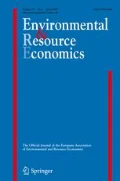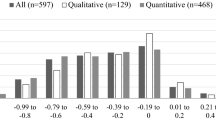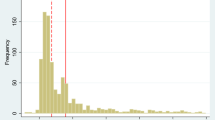Abstract
Individuals are widely believed to overstate their economic valuation of a good by a factor of two or three. This paper reports the results of a meta-analysis of hypothetical bias in 28 stated preference valuation studies that report monetary willingness-to-pay and used the same mechanism for eliciting both hypothetical and actual values. The papers generated 83 observations with a median ratio of hypothetical to actual value of only 1.35, and the distribution has severe positive skewness. We find that a choice-based elicitation mechanism is important in reducing bias. We provide some evidence that the use of student subjects may be a source of bias, but since this variable is highly correlated with group experimental settings, firm conclusions cannot be drawn. There is some weak evidence that bias increases when public goods are being valued, and that some calibration methods may be effective at reducing bias. However, results are quite sensitive to model specification, which will remain a problem until a comprehensive theory of hypothetical bias is developed.
Similar content being viewed by others
References
R. C. Bishop T. A. Heberlein (1979) ArticleTitleMeasuring Values of Extramarket Goods: Are Indirect Measures Biased? American Journal of Agricultural Economics 61 926–930
R.C. Bishop T.A. Heberlein (1986) Does Contingent Valuation Work? R. Cummings D. Brookshire W. Schulze (Eds) Valuing Environmental Goods: A State of the Art Assessment of the Contingent Valuation Method Rowman and Allenheld Totowa, NJ
P. Bohm (1972) ArticleTitleEstimating the Demand for Public Goods: An Experiment European Economic Review 3 111–130
D.S. Brookshire D.L. Coursey (1987) ArticleTitleMeasuring the Value of a Public Good: An Empirical Comparison of Elicitation Procedures The American Economic Review 77 554–566
T. Brown (1984) ArticleTitleThe Concept of Value in Resource Allocation Land Economics 60 231–246
R.T. Carson N.E. Flores K.M. Martin J.L. Wright (1996) ArticleTitleContingent Valuation and Revealed Preference Methodologies: Comparing the Estimates for Quasi-Public Goods Land Economics 72 80–99
P.A. Champ R.C. Bishop T.C. Brown D.W. McCollum (1997) ArticleTitleUsing Donation Mechanisms to Value Nonuse Benefits from Public Goods Journal of Environmental Economics and Management 33 151–162
R.G. Cummings G.W. Harrison E.E. Rutström (1995) ArticleTitleHomegrown Values and Hypothetical Surveys: Is the Dichotomous Choice Approach Incentive-Compatible? American Economic Review 85 260–266
R.G. Cummings L.O. Taylor (1999) ArticleTitleUnbiased Value Estimates for Environmental Goods: A Cheap Talk Design for the Contingent Valuation Method The American Economic Review 89 649–665 Occurrence Handle10.1257/aer.89.3.649
M. Dickie A. Fisher S. Gerking (1987) ArticleTitleMarket Transactions and Hypothetical Demand Data: A Comparative Study Journal of the American Statistical Association 82 69–75
V. Foster I.J. Bateman D. Harley (1997) ArticleTitleReal and Hypothetical Willingness to Pay for Environmental Preservation: A Non-Experimental Comparison Journal of Agricultural Economics 48 123–138 Occurrence Handle10.1111/j.1477-9552.1997.tb01140.x
J.A. Fox J.F. Shogren D.J. Hayes J.B. Kliebenstein (1998) ArticleTitleCVM-X: Calibrating Contingent Values with Experimental Auction Markets American Journal of Agricultural Economics 80 455–465
W.M. Hanemann (1984) ArticleTitleWelfare Evaluations in Contingent Valuation Experiments with Discrete Responses American Journal of Agricultural Economics 66 332–341
Harrison G.W., Rutstroüm E.E., (forthcoming). Experimental Evidence on the Existence of Hypothetical Bias in Value Elicitation Methods. In: Smith V.L., ed, Handbook of Results in Experimental Economics. New York, Elsevier Science
T.A. Heberlein R. Bishop (1986) ArticleTitleAssessing the Validity of Contingent Valuations: Three Field Experiments Science of the Total Environment 56 434–479
J.R. Irwin P. Slovic S. Lickenstein G. McClelland (1993) ArticleTitlePreference Reversals and the Measurement of Environmental Values Journal of Risk and Uncertainty 6 5–18
M. Johannesson (1997) ArticleTitleSome Further Experimental Results on Hypothetical versus Real Willingness to Pay Applied Economics Letters 4 535–536
J.A. List (2001) ArticleTitleDo Explicit Warnings Eliminate the Hypothetical Bias in Elicitation Procedures? Evidence from Field Auctions for Sportscards American Economic Review 91 1498–1507 Occurrence Handle10.1257/aer.91.5.1498
J.A. List (2003) ArticleTitleUsing Random nth Price Auctions to Value Non-Market Goods and Services Journal of Regulatory Economics 23 193–205
J.A. List C. Gallet (2001) ArticleTitleWhat Experimental Protocol Influence Disparities Between Actual and Hypothetical Stated Values? Environmental and Resource Economics 20 241–254
J.A. List J.F. Shogren (1998) ArticleTitleCalibration of the Difference between Actual and Hypothetical Valuations in a Field Experiment Journal of Economic Behavior and Organization 37 193–205
J. Loomis T. Brown B. Lucero G. Peterson (1996) Improving Validity Experiments of Contingent Valuation Methods: Results of Efforts to Reduce the Disparity of Hypothetical and Actual Willingness to Pay. Land Economics 72 4450–4461
J. McKenzie (1993) ArticleTitleA Comparison of Contingent Preference Models American Journal of Agricultural Economics 75 593–603
H.R. Neill R.G. Cummings P.T. Ganderton G.W. Harrison T. McGuckin (1994) ArticleTitleHypothetical Surveys and Real Economic Commitments Land Economics 70 145–154
G.L. Poe J.E. Clark D. Rondeau W.D. Schulze (2002) ArticleTitleProvision Point Mechanisms and Field Validity Tests of Contingent Valuation Environmental and Resource Economics 23 105–131
J.A. Sinden (1988) ArticleTitleEmpirical Tests of Hypothetical Biases in Consumers’ Surplus Surveys Australian Journal of Agricultural Economics 32 98–112
V.K. Smith C. Mansfield (1998) ArticleTitleBuying Time: Real and Hypothetical Offers Journal of Environmental Economics and Management 36 209–224
Author information
Authors and Affiliations
Corresponding author
Additional information
JEL classifications: C9, H41, Q26, Q28
Rights and permissions
About this article
Cite this article
Murphy, J.J., Allen, P.G., Stevens, T.H. et al. A Meta-analysis of Hypothetical Bias in Stated Preference Valuation. Environ Resource Econ 30, 313–325 (2005). https://doi.org/10.1007/s10640-004-3332-z
Accepted:
Issue Date:
DOI: https://doi.org/10.1007/s10640-004-3332-z




